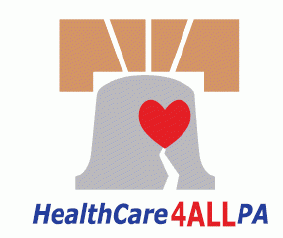| Back OpEd News | |||||||
|
Original Content at https://www.opednews.com/articles/Study-proves-that-single-p-by-Chuck-Pennacchio-130311-711.html (Note: You can view every article as one long page if you sign up as an Advocate Member, or higher). |
|||||||
March 11, 2013
PA Study Proves Single-payer Health Care Will Save $17 Billion Annually and Cover Everybody in PA
By Chuck Pennacchio
A new study demonstrates that Pennsylvania can provide comprehensive, universal health care to every Pennsylvanian while saving billions of dollars in the process. It is time the United States, was no longer the only holdout among the 34 advanced industrialized countries in the world, all of whom, but us, have universal health care. The states can lead the way toward making this a reality.
::::::::
As Executive Director of Health Care for ALL PA, I am proud to share the recent Economic Impact Study of our one payer legislation designed to provide comprehensive, affordable healthcare to every Pennsylvanian.Chuck Pennacchio
A single-payer health care plan will save Pennsylvania families, businesses and tax payers $17 billion annually while providing comprehensive health care to all, according to an economic impact study released today.
Commissioned by Health Care for All PA, a statewide non-profit organization, the study was conducted by University of Massachusetts - Amherst professor of economics Gerald Friedman, Ph.D.
It compares the cost of the current for-profit health insurance model in Pennsylvania under which provider choice is limited and health services are rationed by health insurance companies to that of a consumer-driven health care system which gives people freedom to choose their own doctors, hospitals and health care providers.
The legislation to create this single-payer system will be re-introduced in the Pennsylvania Senate (Senate Bill 400) on March 19 by Senator Jim Ferlo. The name of this state-based, consumer-driven health care system will be The Pennsylvania Health Care Plan.
Some of the important advantages of The Pennsylvania Health Care Plan are:
Comprehensive coverage for every resident of Pennsylvania, including dental, vision, mental health and prescription drug services;
Eliminates the need for hospitals to absorb the cost of care for the uninsured;
Reduces bureaucracy for private physicians resulting in reduced administrative costs and
improved compensation for private physicians;
Reduces or eliminates health insurance over-costs for small business, allowing for more job
creation, greater reinvestment of profits, and reduced workers' compensation costs.
Radically reduces the total cost of health care to levels more consistent with costs in the rest of the industrialized world.
A one-page Executive Summary along with the full text of the Economic Impact Study is available on our website here:
Please spread the word. Contact your friends and legislators. Help us with donations for advertising and speaker transportation costs. Health care for all IS possible in Pennsylvania, but only if we demand it.
Read the entire study here:
Authors Website: https://www.onepayerstates.org
Authors Bio:
Chuck Pennacchio, Ph.D., is a five-decade issue, electoral, and union organizer; president of the One Payer States network (onepayerstates.org); senior advisor to Healthcare for All Pennsylvania; co-founder of Our Revolution PA; founder of the Justice for All Network (justiceforall.global); lead-producer of the single-payer documentary "Fix It: Healthcare at the Tipping Point" (fixithealthcare.org); 2016 Bernie Sanders delegate; 2006 Democratic primary candidate for the United States Senate (PA); aide to four U.S. Senators and one U.S. House Member, 1979-1988; 32-year history and politics professor at University of the Arts in Philadelphia, Delaware Valley University (PA), Texas A&M-Corpus Christi, and University of Colorado-Boulder; and author/co-author of several books, book chapters, and articles on U.S. and European history, U.S. healthcare, and U.S. politics. More importantly, Chuck is the father of two children, Sophia (28) and Ben (25), who are politically and intellectually engaged citizens. He is registered to vote in Sharpsburg, Pennsylvania, but "lives virtually" in 25 states, and "mentally occupies" the transcendent cities of Berlin, Berkeley, and Philadelphia.
